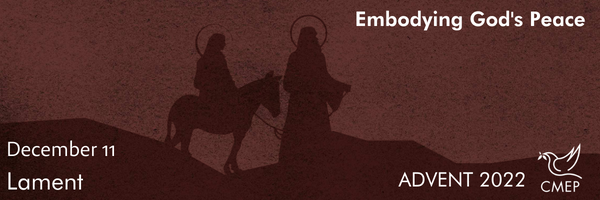
Lament
Kelley Nikondeha
The days before the first advent were dark and loud with suffering. Empires pounded the land of Israel and Judea incessantly with militaristic campaigns and exploitive economics — so violent. No man, woman, or child was spared the trauma of successive invasions and mounting losses. Still, families tried to survive the punishing oppression with faith in God, despite the divine silence in the face of their pain. Loss and lament blanketed the landscape. For those who know Israel-Palestine today, it sounds all too familiar.
When the Seleucids terrorized the region and defiled the Temple, the books of I and II Maccabees tell us one priest and his sons stood up to the empire. But first came lament. Mattathias echoed the sentiment of Lamentations, the tour de force of grief in the aftermath of another empire, another season of terror, another time the Temple suffered sacrilege at the hands of foreigners. He joined the lament of his ancestors, mourning more loss and making his discontent known to God.
But when he could bear it no longer, he took matters into his own hands and lunged at a soldier. It triggered an armed revolt. And then the Maccabees experienced a victory characteristic of David’s defeat of Goliath. They rededicated the Temple – lighting the Eternal Flame and celebrating God’s presence among them once again. Hanukkah commemorates this season of liberation and light. But it was short-lived, because another empire was on the horizon.
There would be more Jewish suffering to come, at home and abroad, more reasons to lament. And as we consider the landscape of the first advent, and all those since, a tenor of lament still seems appropriate for lands riddled with injustice. And we know that Palestinian suffering would be added to the heaviness of the Holy Land, another catastrophe visited upon another people longing to live at peace in their ancestral land. So we can bring our grief over check-points, home demolitions, land disputes and water disparities to God. We can cry aloud about military campaigns targeting Gaza, suicide bombers in Israeli cities, conflicts around the Temple Mount and brutality in Hebron. Our lament is a holy response to the on-going pain and injustice of Israel-Palestine today.
When our Jewish friends light their Hanukkah candles remembering liberation from an imperial force, they also remind us of ancient atrocities that were the predicate to the first advent. Maybe the soft glow of their festival of light can allow us to enter advent with a deeper awareness of the pain of injustice and the desire for tangible freedom from all oppression. Perhaps as we light the candles of our advent wreaths, we can whisper our own lament in solidarity with so many trying to survive troubled times in the Holy Land and our own neighborhoods.
The Romans were a punishing presence in the region, ending Jewish self-rule and consigning Jerusalem to be a subject of the empire. But with Caesar came world peace, as he brought an end to all wars during his time and was hailed as the savior of the world. It is curious that God inaugurated a peace campaign at such a time in history, when peace had been achieved. Unless God’s peace campaign functioned as a critique of Caesar’s peace – revealing the world’s idea of peace as phony. Maybe violence to secure resources for the privileged few at the expense of the many was not what true peace looks like. Maybe economic exploitation, daily humiliation, and land forfeiture did not look like God’s kind of peace, either. And so the advent narratives in the gospels of Luke and Matthew would show us the seeds of God’s peace in Palestine and beyond.
We are invited to embody God’s peace campaign —
and lamenting the suffering caused by injustice is a good place to begin.
We join our Jewish brothers and sisters, who know too deeply the pain of generational trauma
and the incessant fear of annihilation.
We lock arms with our Palestinian siblings, so many living under active
occupation or living as refugees in the diaspora.
We add our lament to theirs and cry out for justice to come,
for suffering to cease, and for God’s peace to visit us all in lasting ways.
____
Author Kelley Nikondeha is a practical theologian hungry for the New City. She is the co-director and chief storyteller for Communities of Hope, a community development enterprise in Burundi. Kelley is the theologian in residence for SheLoves Magazine. Her latest book is “The First Advent in Palestine: Reversals, Resistance, and the Ongoing Complexity of Hope”. Find out more about Kelley’s work on her website: https://kelleynikondeha.com/.
CMEP’s first Advent Devotional Book: In addition to our usual Advent Devotionals, CMEP is pleased to have partnered with author Kelley Nikondeha to create a devotional book entitled “The First Advent: Embodying God’s Peace Plan” that is available for purchase for you or your church group. This devotional book contains devotionals for each Sunday of Advent, including Christmas Eve and Christmas Day, as well as Alternative Advent Practices written by members of CMEP’s staff. Click here to purchase
CMEP is very thankful for those writers who contribute Spiritual Resources. However, CMEP does not necessarily agree with all the positions of our writers, and they do not speak on CMEP’s behalf.

